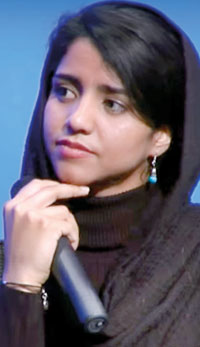Sunday Times 2
Afghan teen rapper sings and advocates to end child marriage
View(s):By Bassam Sebti
At first she looks like any bride: wearing a white wedding dress with her face covered with the wedding veil and carrying a bridal bouquet. Except that she is no ordinary bride. She is being sold.

Sonita: Singing for a cause
As she removes her veil from her face, her forehead appears marked with a barcode. Her left eye is badly bruised and a big scratch on her cheek is as red as a war wound.
The girl in the music video “Brides for Sale” is portrayed by Sonita Alizadeh, an Afghan teen rapper who sings in the video about the ordeal many girls in Afghanistan go through when are sold by their families to marry at an early age in return for money.
But why is she singing about this issue?
Because she herself was about to be sold to wed a man, first at age 10 and then at 16. The seller? Her mother. The money was going to be used to cover her brother’s wedding costs. Teenage Sonita Alizadeh decided that marrying at an early age was never going to happen.
Unlike many in her war-torn country of Afghanistan, the 19-year-old made her own decision, defying the tradition that has been running for generations.
“There are so many girls who do not have [a vision] for their future or any hope,” said Sonita at a recent World Bank event on fragility, conflict, and violence.
Sonita’s family fled to Iran because of the war. There, new horizons opened to the young Afghan refugee woman. One important change was her family’s belief in selling her to wed.
“Since my family realized I have power in the world, they changed their mind about me having to marry,” said Sonita. “Now, they support me and my choices.”
Ending child marriage, Sonita adds, has to start with families. “Parents think they must [have their daughters get married] because it is tradition. Families need to know new ways, new ideas, and see other possibilities for their daughters.”
Among the new ways on which she shed light is talking with community and religious leaders to help change these traditions. She also stressed supporting girls to “see there are other possibilities for themselves, so that they can believe in themselves.” Meanwhile, governments and organizations are needed to support ending child marriage programs, she said.
“Do you know why I believe that this can be done?” she asked with a shy smile.
“Because I was one of them and now I’m here in front of you!”
The refugee Afghan advocate is now living in the United States, where she landed a scholarship to a music school in Utah, continuing her studies and building a better future.
“For me, music is a powerful tool for social change,” she said. “I want to keep making music, but it is not my only job. I want to become a lawyer for women’s rights. I was born in a place where no one cares about women’s rights, and I know what that does to girls, especially to the society.”
Courtesy http://blogs. worldbank.org/

